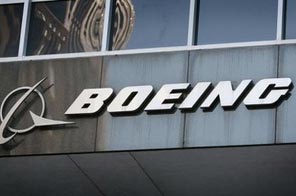Boeing says too early to speculate on China sanctions
SINGAPORE: Aerospace giant Boeing said on Tuesday that it was too early to speculate about the impact of any Chinese sanctions on US firms as a result of American arms sales to Taiwan.
"This a government-to-government issue... These types of sales are between governments and we cannot control them," said Boeing's vice president for marketing, Randy Tinseth.
"I believe it's too early to speculate on what the impact might be to the industry and to us," he told reporters on the sidelines of the Singapore Airshow.
Boeing officials said on Monday that the company had not been notified of any sanctions to be imposed by China in retaliation for a 6.4-billion-dollar US arms sale to Taiwan announced last week.
Beijing said Saturday it would suspend military and security contacts with Washington and threatened to impose sanctions on US firms involved in the deal. Boeing is one of the companies involved, through its McDonnell Douglas unit. Related article: China-US spat over Taiwan arms
Marion Blakey, chief executive of the Aerospace Industries Association which represents US firms in the civil and military sectors, expressed hope that Washington and Beijing will be able to resolve the issue.
"Those discussions are really left best to government to government, and we will certainly see that they undoubtedly will discuss the ramifications, but there is nothing really unusual about this,' Blakey said at the Singapore aerospace fair.
"I think it's the sort of things that the governments will work out together," she added.
China is Boeing's biggest international market, and the company is working hard to grab the lion's share of the booming demand it expects in coming years from Chinese airlines.
McDonnell Douglas is selling Harpoon missiles to Taiwan as part of the arms sale announced by the Pentagon on Friday.
Lockheed Martin, another US defence giant, is providing Patriot anti-missile batteries, and United Technologies unit Sikorsky Aircraft is supplying Black Hawk helicopters.
In Beijing, a Chinese foreign ministry spokesman warned the United States that their cooperation on international and regional issues could suffer over Washington's decision to sell arms to Taiwan.
"We strongly urge relevant US companies to stop pushing forward and taking part in the arms sales to Taiwan," Ma Zhaoxu told reporters.
Boeing's Tinseth said China is forecast to require about 3,800 passenger aircraft worth 400 billion US dollars over the next 20 years to meet an expected explosion in travel demand.
"The Chinese market has been amazing last year... As lots and lots of markets struggled last year, about 220 million people in China travelled domestically -- that was up about 21 percent from the year before," Tinseth said.
Another 15 million Chinese passengers travelled on international routes in 2009, he said, citing data projecting that air travel will grow 13 percent on the mainland this year.
The International Air Transport Association (IATA) said Monday that Asia had overtaken North America as the world's largest air travel market with 647 million passengers in 2009.
Within Asia, China has eclipsed Japan over the past decade as the region's largest domestic market, with 1,400 aircraft compared with Japan's 540 and 5.7 million weekly seats against 2.6 million in Japan.






